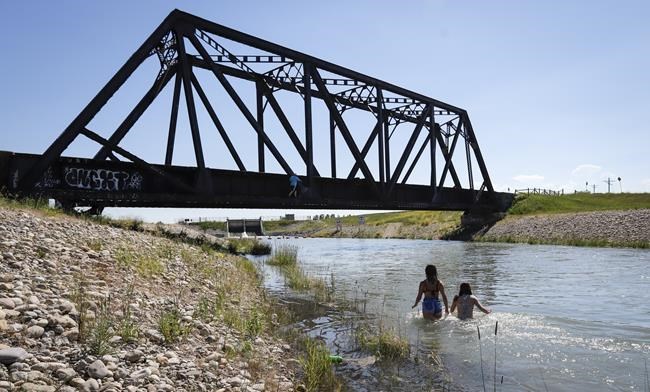Record-breaking sizzling temperatures hitting parts of eastern B.C. and the Prairies is extremely significant and signals how global warming is making heat waves across the region, an Environment Canada meteorologist says.
Record heat eased for parts of British Columbia, Yukon and the Northwest Territories on Wednesday, but Alysa Pederson warned relief is still days away for eastern B.C. and the Prairies.
"With climate change, we can expect that the intensity and the duration, and even the frequency of extreme events like this will increase," Pederson says.
"This event is of particular importance because of the longevity of it. I mean, just in Edmonton ... we're forecasting eight days in a row with temperatures above 30 C. It's very scary. It's shown to be deadly."
Conditions remain dangerously hot from southern and central B.C. east to Manitoba.
The village of Lytton, B.C., set a Canadian heat record Tuesday for the third consecutive day as temperatures reached 49.6 C, edging the 47.9 C mark set there on Monday.
Forecasters are calling for temperatures into the low 40s for B.C.'s Interior regions until Friday.
Pederson says Alberta has broken 107 daily records that were set in the 1930s and 1940s.
"Right now, our overnight minimum temperatures are basically only dropping to what our normal is for this time of the year for daytime highs," Pederson said.
She added that the above-normal temperatures in the province are expected to last into the first two weeks of July.
"(There's a) dome of hot air sitting over B.C., Alberta, and now it's moving east to Saskatchewan and Manitoba. The way the atmosphere has set itself up, it makes it really hard for any of these weather patterns to shift too quickly."
Saskatchewan and Manitoba likely won't see cooling until next week, but conditions that have left Yellowknife sweltering in 30 C heat were expected to lift by the end of the day.
B.C. Public Safety Minister Mike Farnworth said the province will look at including heat waves in its rewrite of the province's Emergency Program Act, which helps with responses to natural disasters.
He defended the government's response to the heat wave, saying Emergency Management B.C. had warned communities about the need for cooling stations and other measures.
"The reality is we have never seen anything like this in British Columbia, in fact in the country," he said, adding that there have only been three heat-related deaths in the province in the past five years.
Farnworth said the province will also be waiting to see the chief coroner's report into the situation to determine further steps.
B.C. chief coroner Lisa Lapointe said there have been 486 sudden or unexplained deaths since Friday, a 195 per cent increase in the average normally seen during a five-day period, with heat a likely factor for the higher number of deaths.
She said coroners have anecdotally heard that many of the deaths were among people who lived alone, highlighting the need to check on neighbours and family members.
Temperatures receded in parts of Metro Vancouver, but some residents said the recent record-breaking heat would force them to be better prepared for next time.
Archie and Clem Anos spent part of Wednesday at Vancouver's New Brighton Park, with both saying the drop in temperatures was a welcome relief.
"Monday, I went to work and it was awful," said Clem Anos. "We tried to open the window but it was hot air coming inside."
Archie Anos said he and his wife had air conditioning in their home, but it only helped so much.
The couple said they will invest in a better air conditioner unit before the next heat wave hits.
Ruth Miller said she, her partner and six-month-old daughter spent large parts of Monday and Tuesday indoors to avoid the heat.
Miller, who was relaxing with her daughter in the shade at the park, said her home doesn't have an air conditioner and the couple used fans to try to stay cool. The family bought a paddling pool, stayed indoors and tried to only go to places that had air conditioning, she said.
Fortunately, Miller said, her daughter didn't seem to notice the heat.
"She didn't actually notice, she didn't cry or anything. I just worried and woke up every hour in the night," she said.
Miller said she and her partner have already discussed ways to better manage a heat wave when one next hits.
Vancouver police said in a statement posted to Twitter that 53 sudden deaths were reported Tuesday, which they attributed to the heat wave.
This report by The Canadian Press was first published June 30, 2021.
Nick Wells and Fakiha Baig, The Canadian Press

